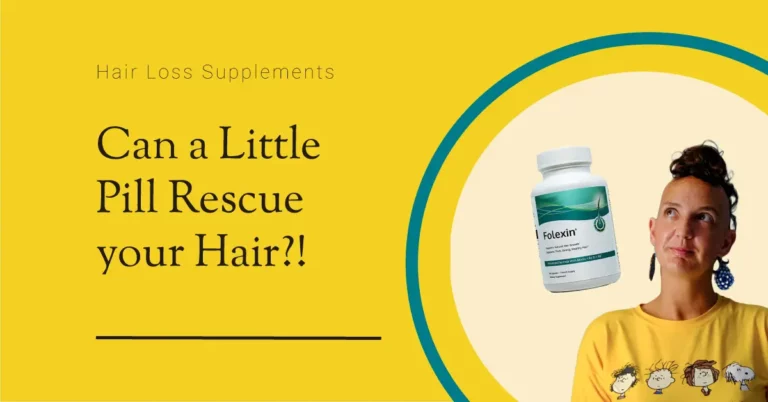
What’s the Connection?
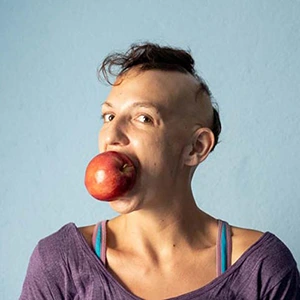
The father of medicine wasn’t just high on olive juice when he said that. And although many GPs still scoff at the idea that the gut, the immune system and symptoms like alopecia are linked, more progressive professionals can see the bigger picture. Thankfully.
During my 20+ years as an alopecian, I’ve seen dozens of doctors, dermatologists and trichologists. I’ve had steroid creams and injections, taken various pills and slathered on whatever new hair loss shampoo promised to work wonders. (Some of which worked – but never on a long-term basis).
Functional medicine sees the body as a whole, rather than dissecting it into different parts. And the thing that keeps this complex machine operating is our gut. It isn’t just “you are what you eat”, more like “you are what you digest and absorb”. Less catchy, sure, but true!
I always had a sneaking suspicion that my poor digestion, my sporadic menstrual cycle and my alopecia were linked. When one improved, so did the other. And when one stopped working… hello, hair loss.
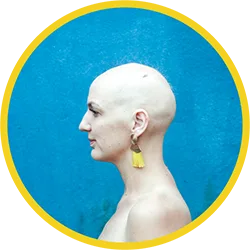
Emma’s ‘not a doctor’ disclaimer
Hi there, I’m an alopecian, I’m not a doctor! Any advice I give is based on my own research and personal experiences. This site, is however, reader-supported. When you buy through external links, I may earn a tiny affiliate commission. Learn more here.
It wasn’t until reading a great book called The Autoimmune Solution that I realized just how important gut health is for those on the “autoimmune spectrum” – it can be the difference between developing a full-blown autoimmune disease, or keeping it at bay.
I also learned that my seemingly healthy diet – which included lots of lentils, seeds and wholegrain foods – was, at the time, destroying my poor immune system even further. The book provided many revelations and more importantly, set out a practical way in which I could heal my gut to reverse my hair loss.
I won’t get into too much detail – you should read the book for that – but it maintains that gluten is NOT our friend.
And while many conventional GPs say the gluten-free movement is just a fad, and that only a tiny proportion of people are coeliac (which is true – only 1% of the population in the US) they’re discounting that another 6% of us of us are gluten sensitive. Meaning up to 20 million Americans have an intolerance to gluten, and are suffering the crappy side effects of it.
For those of us on the autoimmune scale (i.e. who already have, or are at risk of developing, an autoimmune disease), gluten is one of the worst things we could chow down on.
Why? Because gluten is an inflammatory substance. And whenever our immune system encounters inflammation, it attacks. It lashes out at whatever’s in its way; even its own, healthy cells.
So every time we eat gluten, we can trigger this inflammatory response and provoke an attack. (There are plenty of other triggers for this, like toxins and stress, but gluten and sugar are the main culprits).
The scary thing is, if we didn’t live such gluten-filled lives (and gluten is everywhere, from beauty products and supplements to stock cubes, soy sauce and even ground spices), we could have prevented our autoimmune condition from developing in the first place.
So even though I don’t each much bread now, when I was growing up with an already weakened immune system (thanks to my genes), gluten did me no favours. I developed what is known as “leaky gut” at quite an early age. And the corticosteroid injections I took for my alopecia, my long-term use of antimalerials like doxycycline while traveling, plus the amount of booze I consumed at university made the problem a lot worse.
The result? Even though these days I’m quite conscious of what I eat, even though I exercise regularly and am probably the “healthiest” I’ve ever been, my alopecia is showing no signs of letting up. All because of how I treated my gut in the past, and haven’t let it heal since.
Another scary thing? According to Dr Myers, people with autoimmune conditions are 3 times more likely to develop another. So not only do I have to deal with my alopecia, I have to come to terms with the fact that I’m at a much higher risk of developing something like Lupus, the disease that my mother eventually died from.
This site is all about empowering people with alopecia, about refusing to let the condition take over their lives. And while I’m fine with being bald in my day-to-day life – I’ve actually gotten quite used to it – I don’t like the thought that I’m setting myself up for something far more detrimental to my health.
Which is why I decided to embark on a “gut health” journey. To follow the plan laid out in The Autoimmune Solution and to do whatever would be necessary to “heal and seal” my gut.

I’ve tried the autoimmune protocol (AIP) diet twice. The first time, in October 2018, I stuck to it for a month and noticed an improvement in the daily migraines I’d been getting for almost a year.
I also noticed a clearing of the ‘brain fog’ I hadn’t even realized had been hanging over me and an improvement in digestion, mood and energy. It was the first time in years I hadn’t had a daily coffee – and after the first week, I didn’t miss it!
I coupled my new diet with A LOT of supplements and spent huge amount of money/time making 3 organic meals a day from scratch, without any preservatives or any of the ‘trigger foods’ I had to eliminate.
But although I did see improvements after the recommended 30 days, I fell off the wagon soon after. Without working with a professional, and using only the book’s advice, I felt lost – and wondered if all my efforts were worth it. It was incredibly strict, after all, and I ended up stressing so much about what I could or couldn’t eat, going further than a month seemed impossible.
So I went back on all those ‘trigger foods’ the following month and basically, undid all my hard work. It was only when I went to a Functional Medicine doctor the following summer, and got my microbiome tested, plus a more tailored list of supplements, that I had new motivation.
From my tests, my inflammation levels were sky-high and I also had gut dysbiosis – affecting my ability to process nutrients from my food, like Vitamin B, which was in turn affecting my mental health.
I found it incredible to think that I could help how I’d been feeling through diet alone! My hair loss wasn’t my focus at this point; my general wellbeing was and had been at stake for a long time.
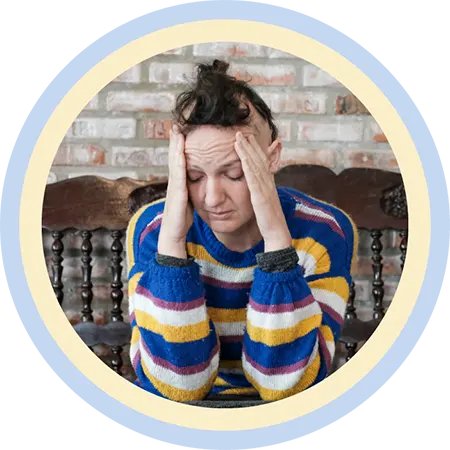
Let me just emphasize: the AIP diet is VERY strict. You have to eliminate A LOT of foods and while it is only for a short(ish) period of time, being so restrictive about your food can be very triggering for some.
I could stick to it easily enough when I could control everything: by cooking for the first month at home. I was staying at my grandmother’s house in the countryside, far from any distractions.
But when I returned to the ‘real world’, it was far too difficult for me personally to keep up with the diet – and it brought up a lot of patterns/tendancies I wasn’t all that aware of until I was on the other side of it all.
So if you have any history of disordered eating, I wouldn’t recommend this diet – of course though, that’s your call to make.
The second time around, my diet was a lot more successful. Perhaps because I started out with a 5-day gut cleanse, which meant that by the time I started the elimination diet, my cravings were already reduced and made it much easier to avoid foods like gluten, dairy, eggs, corn and soy.
And while admittedly, soy was tricky to quit in my home of Vietnam, I did it. I went off alcohol, sugar, all those trigger foods for several months and felt amazing as a result. People commented how well I looked, I had zero bloating or digestive issues, the small mohawk I had became thicker and glossier and my headaches became far less frequent.
Unfortunately…I didn’t keep up the diet this time, either! I wasn’t able to continue seeing the FM doctor back in Ireland and so didn’t get advice on how to reintroduce those foods (which you can do, after a few months).
Having researched anti-inflammatory diets further since – like in this book called Period Power, another one which has changed my life! – I’ve realized I was meant to introduce them one at a time, with the same food three times a day, and look out for any reactions.
So I didn’t have to cut out those foods for life – I just had work out what was causing inflammation for me personally. If only I’d reintroduced them properly back then!
Then it got to a point, in October 2020, when I just couldn’t be bothered being so strict anymore. Lockdowns were hard enough without being able to indulge a little – so I started enjoying pastries, alcohol and other fun things (in moderation, of course!) and you’ll never guess what happened…
Well, first of all, the periods that had escaped me for months returned. I guess not stressing so much about the perfect diet meant I was relaxed enough to menstruate! As a very happy side effect, I became pregnant the following month with my daughter Sunny – something which my doctor had told me, was unlikely at the time.
Having read Period Power since, and about the role of our hormones, I know now it wasn’t all to do with my more relaxed outlook around my diet. More likely, taking a bio-identical progesterone cream helped things along, too.
In any case, when I became pregnant and all I wanted were beige things in the first trimester, I wasn’t about to deny myself. And when I had Sunny, my outlook on so many things changed. I didn’t want her to get any hang-ups I had about food, or to pick up on any stress I might be feeling if there’s no gluten-free option on the menu.
While I know that gluten isn’t good for me – and I suspect, from my time on the AIP diet and the symptoms I tracked, that eggs and soy are personal triggers, too – I’m continuing to have these things, for now. Maybe one day I’ll do the diet again, and do it PROPERLY, the third time around!
But for now, I’m happy keeping these foods to a minimum, when I can. Knowing I can have and enjoy a pizza some night if I want – but being aware that I may just crave bread a lot more for a few days after and try to resist that temptation.
I know if my headaches get bad or I’m crazily bloated, then I’m probably going through a time of higher inflammation. Of course, I’d rather not experience it. But I can recognize it, try not to feed it too much further and just go on living my life.
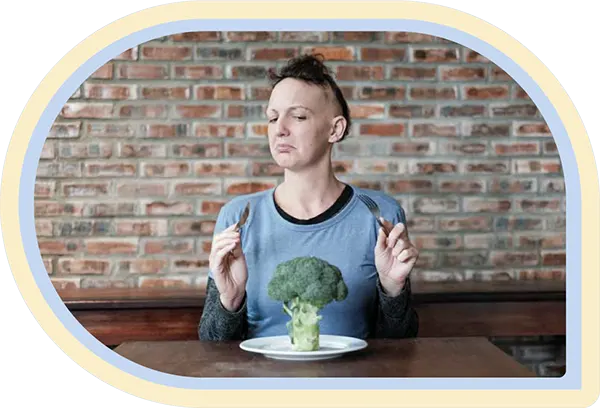
I would love to do an elimination diet again, I really would. Because I know it helped me before and I think it has the potential to help my mental and physical health a lot – maybe even to make my hair grow back!
But I’ll say it again: the AIP diet is HARD. You need to be super disciplined to stay off all those foods, highly organized in planning your own meals (which will probably differ to your family’s) and vigilant in checking the ingredients used in whatever restaurant you might plan on visiting.
If there’s a time in my life coming up when I can fully commit to all these things, I’ll try it again. Or at least, do a less extreme version, where I simply cut out my main trigger foods and slowly introduce them back in, if I can.
For now though, with a toddler taking up most of my energy, it just doesn’t suit me! I’m also now at a place of much greater acceptance with my bald head and since my headaches have pretty much cleared up (or I know how to minimize them), a diet that could upend my life isn’t my priority. Sunny is.
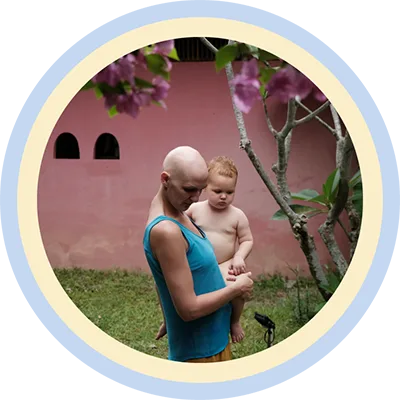
I’d recommend everyone try the elimination diet once to see if it can help them with issues they might be experiencing. (BUT this is only if you don’t have any history of disordered eating; if you feel like such a restrictive diet might trigger you in any way, then please, please avoid it).
At the very least, it’s a good thing to be aware of: that we don’t need so much gluten, dairy or sugar in our lives. That we can support our gut microbiome by supplying it with healthy bacteria in fermented foods or by maybe taking additional supplementation (for me, it was a good probiotic, plus Omega-3s and a Vitamin B complex after a lot of other stuff to heal my leaky gut).
You might even want to try a supplement to help your hair growth, which will include gut-supporting vitamins as well as certain minerals many of us with autoimmune conditions might be deficient in. Check out my posts on Folexin supplements or Nutrafol hair supplements for more.
I wrote this post after readers asked me to update them from my previous introduction to the AIP diet. And I’m sorry I can’t offer a more linear story – like “hair was bad, started diet, hair grew back!” – etc. But all I can say is, it’s a constant learning experience. I’m still trying things out.
Still, I hope my experience can help you in some way, whether you want to try the full diet, to cut a few things out, or to not do any of it. All of which is ok!
I’m curious to hear your own stories around gut health and hair loss – have you spoken to anyone about it before, or noticed a link in your own life? Share your thoughts and experiences below, if you feel comfortable!
Love and hugs,
Get free, semi-regular alopecia-related news things and musings.
Psst… If no welcome email shows up, check your spam.
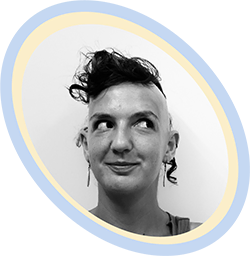
Alopecian. Yoga Teacher. Copywriter. Here to share information, offer support and show people the adventures that can lie in hair loss. I’m proud to have alopecia and I want to help others embrace their baldness, too!

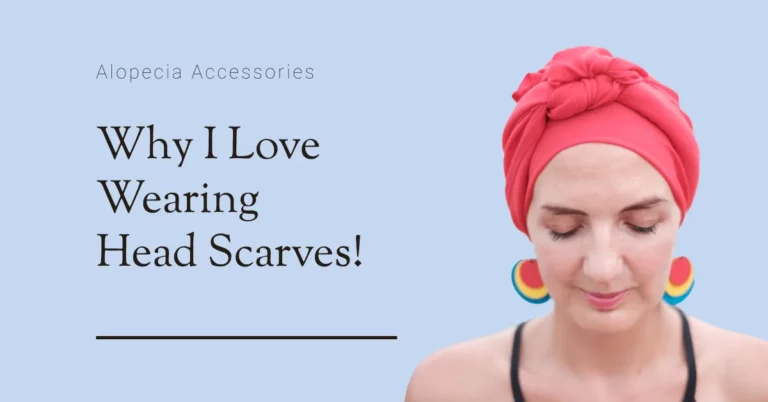

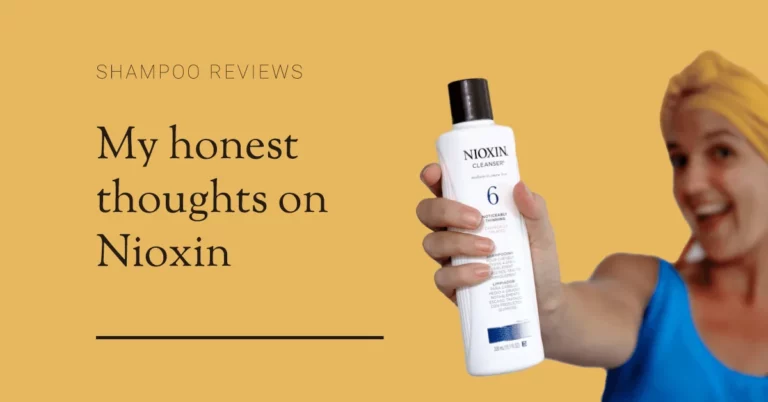

Every month, thousands with hair woes visit my site. The more the merrier! But it takes AGES to write posts and reply to emails. Don’t get me wrong, I love it! But running a website isn’t free. So I’m trying something new: I’m asking for your support. If Lady Alopecia has helped you, please consider buying me a (virtual) coffee or even become a patron of the site. Thanks!
I’m Emma. I’ve had alopecia for 24 years and I’m here to inform/hopefully empower people like me! Read my full story here. But I’m not a doctor, so any advice here is based on my own research and experience. I’m also in a few affiliate programs – see my disclaimer page for more. Or contact me here. Also, why not join a thousand fellow alopecians and get my-semi regular hair about life with irregular hair?
Psst… If no welcome email shows up, check your spam.

Small print time: Ladyalopecia.com is a participant in the Amazon Services LLC Associates Program, an affiliate program designed to provide a means for sites to earn advertising fees by advertising and linking to Amazon.com.
Copyright © 2023, Lady Alopecia. All rights reserved. Important – By using this website, you promise not to steal stuff. Thank you kindly.
Join the gang and receive semi-regular news and joy from someone with very irregular hair.
2 responses
Dear Emma thankyou for your latest email I found the article about gut health very interesting . I am 67 years old & back in 2021 my hair started shedding quite a lot then one morning I was brushing my hair when I noticed bald spots it’s as if it happened overnight I was diagnosed with Alopecia Areta it has since grown back and to my amazement no grey hairs but it is very fine and my fingernails are still not in great shape after reading your article I am going to try and cut down on my love of carbs etc and when I get back from my holiday I will order Floxein and see if this helps . Congratulations on your baby girl regards Sharon X
Dear Sharon,
Thanks so much for taking the time to share your feedback and your experience – much appreciated! I was really sorry to read about your alopecia areata…but then, so great to hear it’s come back! Even if the hairs are quite fine, it’s wonderful to know that regrowth is possible. And yes, maybe a good idea to cut down on that gluten (if possible, don’t stress yourself too much!) and a supplement like Folexin could be very helpful for both your hair and your nails! Take care, and let me know how you get on…thanks so much for your words of congratulations, too.
Love Emma xo